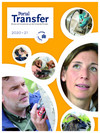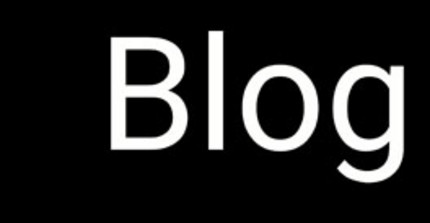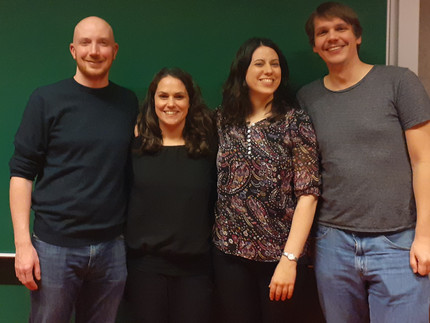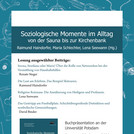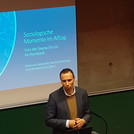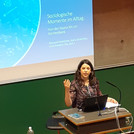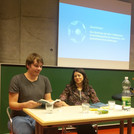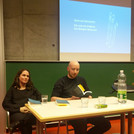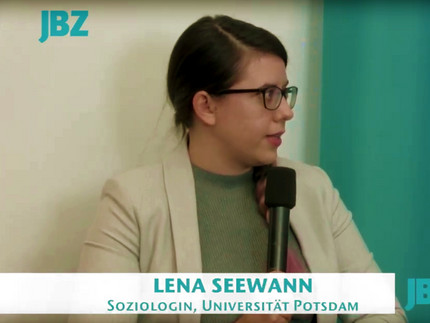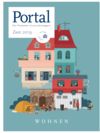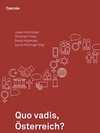Media Reports
2024
It was once ... 35 years since the fall of the Wall
Interview im Universitätsmagazin (Portal | ZWEI 2024) / Interview with the university magazine of the University of Potsdam
PSMM: Potsdamer Social Media Monitor
The Potsdam Social Media Monitor (PSMM) was founded in 2024 at the Faculty of Economics and Social Sciences at the University of Potsdam. Its mission is to develop methods to measure the use, content and impact of social media and to create accountability tools for social media platforms. PSMM utilizes a variety of interdisciplinary approaches, including from sociology, political science and computer science.
The pilot project is a TikTok election monitor for the regional elections in Saxony, Thuringia and Brandenburg taking place in September 2024. The focus is on first-time voters and how their use of TikTok influences political opinion formation and attitudes.
Interview Universität Potsdam / Interview University of Potsdam
Artikel beim RBB "AfD dominiert Tiktok im Parteienvergleich" vom 02.09.2024 / Article RBB
Artikel beim RBB "Tik Tok und die Wahlen" vom 02.09.2024 / Article RBB
Ergebnisse zur "Sichtbarkeit der Parteien in den TikTok-Feeds von Erstwähler*innen" / Results
Artikel in der Frankfurter Rundschau vom 31.08.2024 Article Frankfurter Rundschau
Interview Deutsche Welle vom 02.09.2024 / Interview Deutsche Welle
Values are drifting apart worldwide
Roland Verwiebe talks about the cultural differences in attitudes and values in an interview with the “Science Media Center Köln”.
Without immigration, Austria would be finished.
In an interview with “Furche”, Roland Verwiebe talks about the political rhetoric on the subject of migration.
Simply rejecting a different attitude is not good for us.
In an interview with SuperIllu, Roland Verwiebe talks about social fronts that are increasingly hardening and explains what needs to change.
Turbulent Times in Brandenburg - Interview with Prof. Dr. Roland Verwiebe at rbb24
On rrb24 Inforadio, Prof Dr Roland Verwiebe talks to Amelie Ernst about the prevailing crises, increasing protests and the social mood in Brandenburg.
2023
TubeWork im Universitätsmagazin
In der ersten Ausgabe im Jahr 2023 des Universitätsmagazins Portal Wissen wird das Projekt TubeWork, welches sich mit dem Berufsfeld der YouTuberInnen in Deutschland beschäftigt, vorgestellt.
2022
"We need to watch out for everybody"
Though the weather is cooling, the atmosphere is getting ever more heated - lots of protests are expected this fall. This was the topic of conversation between Prof. Verwiebe and Gerald Meyer on rbb24 Brandenburg Aktuell on September 6. The Chair emphasized how important it is not to leave anyone behind in hard times.
Other topics were energy poverty, alarmism and the social question - for more listen from minute 2:17.
Interdisciplinary perspectives on the war in Ukraine
There was an open talk about the Ukraine war on June, 23. Prof. Verwiebe attendet this interdisciplinary discussion organized by the FSR Sociology, FSR Slavic Studies, FSR Philosophy and the VeFa. It was moderated by Dr. Bohdan Tokarskyi. Experts from various fields of study discussed how different historical, socio-economic and geopolitical perspectives are relevant for the war in Ukraine and what their consequences may be for people both here and in Ukraine.
Podcast episode about social inequality
Prof. Verwiebe was once again interviewed by pupils from the Ernst-Haeckel-Gymnasium. This time they talked about different aspects of social inequality: distribution of wealth, education, gender pay gap and more. The conversation is part of the summer series of the school's podcast Politikgeflüster, that is asking the question what people are interested in besides politics. It is available whereever you get your podcasts, along with other interesting episodes.
"It's about a good life for the people"
Questions of social justice and social inequality were the topic of Prof. Verwiebe's recent interview with the mobility magazine fairkehr. The questions focused on the situation in Germany and how German cities can reduce inequalities: Prof. Verwiebe named the labor market and the educational system as the best places to start, but also stressed the potential of making changes to housing, public transport, and sustainability.
The whole interview can be found here.
Care-work in transformation: the effects of digitization and the Covid 19-pandemic on paid care work
... is what Dr. Nina-Sophie Fritsch, Christian Berger and Dr. Katharina Mader wrote about on the A&W-Blog. They describe how care professions in Austria have changed due to the pandemic and draw on the general labor market situation. They conclude that the current transformation should be used for a long overdue upgrade of care work.
The Chancellery's interpreter of Eastern Germany
Interview with Prof. Verwiebe and Thomas Bittner (January 12, 2022)
The topic of this interview was the special role of the Parliamentary State Secretary for East Germany and Equivalent Living Conditions. Regarding the problem of unequal living conditions in Western and Eastern Germany, Prof. Verwiebe states that "[p]rimarily, we have a fundamental problem with the social structure of Eastern Germany". He further highlights that the East West divide is by far not the only one of importance in the German society.
2021
Reconciling work and family life
... is the topic of the current issue of Portal, the magazine of the University of Potsdam. Among the authors are the holder of the Chair of Inequality Research and Social Stratification Analysis and his assistant. Prof. Verwiebe focuses on care work - what it is, who is carrying it out and why there is such an imbalance among genders. An important point of his is the following: "The economic and the family principle are contradictory." This is also a theme in Annet Wadewitz's text about the daily challenges of being a single mother to two teenagers during the Covid 19-pandemic.
→ article by Annett Wadewitz / → article by Prof. Verwiebe / → read the magazine
How does the pandemic affect social inequality in our society?
This question was the center of Prof. Verwiebes conversation with pupils from the Ernst-Haeckel-Gymnasium. It was recorded for the school's podcast Politikgeflüster and is part of the "Covid and..."-series. In it, the pupils and Prof. Verwiebe discuss the harmful long-term impacts the pandemic could have on social inequalities. The episode is available whereever you get your podcasts, along with many other interesting episodes to listen to.
Transformations - about the new blog of the University of Potsdam
In the newest issue of the university magazine Portal Transfer Roland Verwiebe talks about both the origins and the future of the blog ≠ transformation. More information can be found here:
2020
The value of work in crisis
The importance of work has diminished, leisure time and family have become more important. But the importance of work for people often only becomes apparent when it is gone.
You've certainly asked yourself the famous lottery question before: You win a large amount of money, so you're set for life. Would you retire or continue to work? If you prefer the latter, you think like a large part of Austrians.
"Work in Austria is incredibly important for individual life", says sociologist Bernhard Kittel of the Institute of Economic Sociology at the University of Vienna.
He speaks of a "very specific situation" by international standards. Leisure time is very important to Austrians compared to work. "At the same time, people can hardly imagine not working." Hungary, for example, take their work very seriously compared to leisure time. "But they would immediately stop working if they could." ...
"People are called upon to support each other" – the social scientist Prof. Dr. Roland Verwiebe on the Covid-19 pandemic
About the Covid-19 pandemic - contributions from the University of Potsdam
"We should all fight for social justice."
Interview with R. Verwiebe, M. Zimmermann and M. Pchalek (February 2, 2020)
In the context of the UN's "World Day of Social Justice", Prof. Verwiebe answered questions on the topic of social justice and spoke about the contribution that research can make to overcome social inequality.
Book reading "Sociological moments in everyday life" from sauna to church bench - Raimund Haindorfer, Maria Schlechter, Lena Seewann (Hg.)
For the first time, the Chair of Inequality Research and Social Stratification Analysis presented a book reading of the recently published anthology "Soziologische Momente im Alltag" on January 28 2020.
The four authors Renate Steger, Lena Seewann, Raimund Haindorfer and David Binders illustrated with their short stories that sociological concepts and theories can often be discovered in everyday situations. The aim of the evening was to introduce sociological thinking to first-year students or people interested in sociology in an entertaining and accessible way.
The following short stories were read:
- "Iwona, Swetlana oder Maria? Die Rolle von Netzwerken bei der Vermittlung von Haushaltshilfen" von Renate Steger
- "Iwona, Svetlana or Maria? The role of networks in the placement of domestic help" by Renate Steger
- "Die Lust am Erlebnis. Das Beispiel Skitouren" von Raimund Haindorfer
- "The pleasure of the experience. The example of ski tours" by Raimund Haindorfer
- "Religöse Rotznase. Die Annäherung von Heiligem und Profanem" von Lena Seewann
- "Religious snot. The convergence of the sacred and the profane" by Lena Seewann
- "Das Gestrüpp am Fußballplatz. Schichtübergreifende Distinktion und symbolische Grenzziehungen" von David Binder
- "The undergrowth by the football field. Cross-layer distinction and symbolic demarcation lines" by David Binder
Developments on the labor market of Vienna
2019
"Does immigration lead to a change in values?"
Lena Seewann at the Robert Jungk Bibliothek, October 28 2019
The immigration from EU-Member States, third countries and refugees from countries at war like Syria increasingly shape life in Austria. Their arrival changes or questions our values. But: Is that true? Lena Seewann presented research findings answering this question on October 28 at the Robert Jungk Bibliothek in Salzburg. With 60 listeners she discussed value systems and how they form in an immigration society. Empirical findings show that value systems of immigrants, their children and the resident population do not differ by much. Nonetheless: Migration is value defining, both for immigrants and those welcoming them.
A summary of the discussion was recorded for FS1 beforehand: https://www.youtube.com/watch?v=GHiL8nybh-E
The book chapter the discussion is based on can be found here: https://link.springer.com/chapter/10.1007/978-3-658-21976-5_11
"Where to live?" - About housing as a commodity and social urban development
A conversation with Roland Verwiebe about the housing market, the value of social mixing as well as both ineffective and hopeful solutions to the problem.
Value change and formation in Austria
Discussion by the research association "Interdisziplinäre Wertforschung" of the University of Vienna on July 18 2019
On July 18 the research association presented the two recently published works "Quo vadis, Österreich? Wertewandel zwischen 1990 und 2018" and "Werte und Wertebildung aus interdisziplinärer Perspektive". Main research findings were displayed and discussed with experts.
Media reports:
• Studie: Soziale Dimension von Religion nimmt zu (ORF) / Study: Social dimension of religion increases
• Studie: Christen und Muslime unterscheiden sich wenig (ORF) / Study: Christians and Muslims hardly differ
• Österreichern werden Freunde und Freizeit wichtiger, Religion nicht (APA) / Friends and free time matter more to Austrians, not religion
Radio-Interview - Deutschlandfunk & Roland Verwiebe
On April 28 2019 Roland Verwiebe talked about "Rechtsruck in Österreich - Politik der Abschreckung" (lurch to the right in Austria - politics of determent) at Deutschlandfunk.
"Refugees need a network for job hunting"
Newspaper interview with Roland Verwiebe, Wiener Zeitung on May 5 2019.


